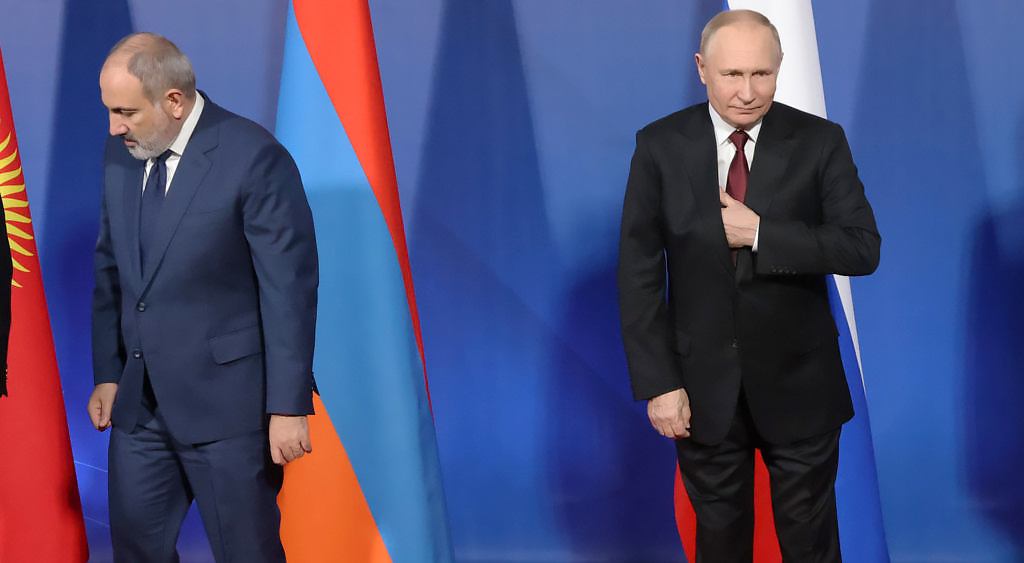Yerevan, Armenia
A rare overseas visit for the embattled Vladimir Putin kicked off on Wednesday afternoon, just moments after yet another colossal barrage of rockets and drones slammed into Ukrainian cities across the Black Sea. Authorities in Kyiv reported power blackouts and water outages due to strikes on ‘critical infrastructure’. At least four people were confirmed to have died, including an infant killed when a missile hit a maternity hospital.
With the bulk of his remaining professional army surrounded on the west bank of the Dnipro River, Putin’s forces beat a hasty retreat a fortnight ago from the only Ukrainian regional capital they’d managed to capture to date, Kherson. Since then, they have reverted to raining down terror from afar, even as Ukrainian forces press forward, taking back more and more of their territory.
“The Russians are running out of hardware, and they’re throwing whatever they have at Ukrainian cities — even anti-aircraft missiles,” says Neil Hauer, a Canadian journalist who visited Kherson in the days since it was liberated. “Every now and then you hear a big bang, but they don’t do much else.”
With the progress of his ‘special operation’ going from bad to worse, Wednesday’s trip was a chance for Putin to prove the ‘Russian world’ was behind him. Attending a summit of the CSTO military bloc, along with the leaders of five other former Soviet states, it should have been a friendly affair. And yet it was anything but, and Putin refused to speak openly about the elephant in the room during the televised proceedings, saying only that he would discuss Ukraine behind closed doors.
Meanwhile, the Kremlin’s supposed allies appeared reluctant to be associated with the invasion. A joint statement issued by member states following the meeting was so watered down that it solely condemned “Nazism” in general terms that few could disagree with, without naming names. What was intended as a slick photo op afterwards was desperately awkward, as videos show Putin’s fellow leaders shuffling away from him, leaving him isolated.
Security for the meeting was intense — barricades went up and snipers were posted on the rooftops. Just that morning, Oleksiy Arestovich, an advisor to Ukrainian President Volodymyr Zelenskyy, told the Times that, following the surrender of Kherson, the “paranoid” Russian leader is living in fear of a coup or an attempt on his life. “Putin is very afraid,” he claimed, “because there is no forgiveness for Tsars who lose wars.”
Outside the secure hotel complex where the meeting was being held, hundreds of Armenians, Russians and Ukrainians gathered to protest the visit, with many calling for Yerevan to pull out of the CSTO altogether. Thirty-four-year-old Irina, a Russian citizen of Ukrainian descent who moved to Armenia in the wake of the war, turned up with a group of friends, holding signs bearing the names of cities plundered and destroyed by Putin’s forces — Kharkiv, Izyum, Bucha. “If I were still in Russia I couldn’t do this,” she says, “but since I’m here I have to make my voice heard.”
According to Dr Ian Garner, an expert on Soviet propaganda and author of a new book on Russia’s pro-war youth, Putin’s increasingly reclusive, distant image is growing. “There is something of a bunker mentality in the Kremlin, and there’s enough verifiable evidence that Putin is isolated in his decision-making,” he says. “But there’s always been a difference between someone like Zelenskyy on the streets of Kyiv, rejecting calls to leave, and Putin in his ornate board rooms.”
“The Kremlin was counting on getting far more support from his CSTO as allies in this Cold War, but the fact that hasn’t materialised is just another sign of how poorly thought-out the war was,” he adds.
Leaving empty-handed, Putin’s private jet roared back over the mountains to Russia, taking its fragile cargo home again — for what many of those left on the ground hope could be the last time.











Join the discussion
Join like minded readers that support our journalism by becoming a paid subscriber
To join the discussion in the comments, become a paid subscriber.
Join like minded readers that support our journalism, read unlimited articles and enjoy other subscriber-only benefits.
Subscribe